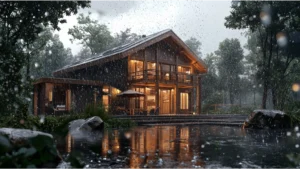When it’s time to replace your roof, it usually comes down to two options: metal roofing or asphalt shingles. Each has its pros and cons. From cost and energy savings to lifespan and curb appeal, your choice will impact your home for years to come.
At Cobex Construction Group, we know how important it is to choose the right system for your budget, climate and long term goals. Whether you’re looking for a durable upgrade or a budget friendly refresh, we’re here to guide you every step of the way.
Asphalt Shingle Roofs vs Metal Roofing: What You Need to Know
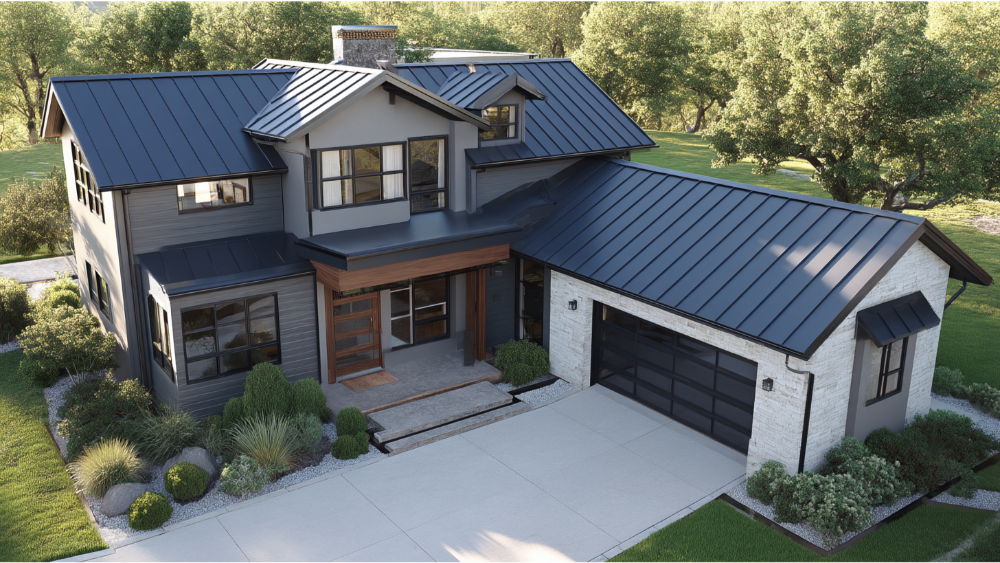
What is a Metal Roof?
Metal roofs are made from aluminum, steel, zinc or copper and come in several forms including standing seam systems and metal roofing panels that mimic the look of traditional roofing materials like slate, tile or wood shingles.
These systems are engineered for performance and are popular on homes and industrial buildings. Metal roofing panels interlock for added durability and are finished with protective coatings to resist corrosion and fading. They look upscale and are long term reliable when installed by experienced roofing professionals.
What are Asphalt Shingle Roofs?
Asphalt shingles are America’s most common roofing material, and for good reason. Asphalt roofing is affordable, easy to install and comes in many colors and styles. These shingles are made with a fiberglass or organic mat core, layered with asphalt and coated in mineral granules for protection and texture.
Asphalt roofs are especially common in residential neighborhoods and are accepted by HOAs and local building codes. While asphalt roof systems don’t last as long as metal, they are a popular choice because of their affordability and availability.
Exceptional Durability: Which Roof Lasts Longer?
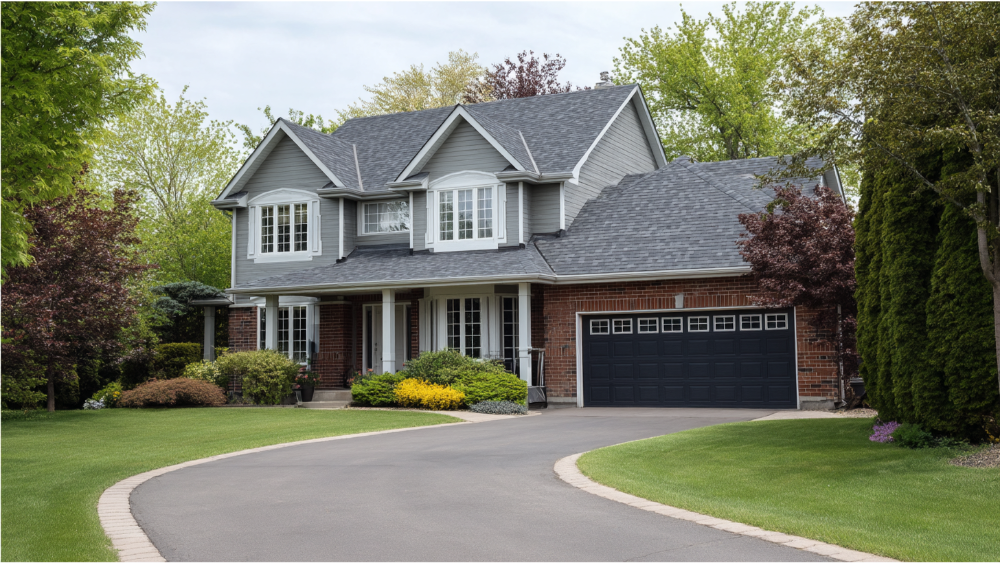
How Long Does a Metal Roof Last?
A metal roof can give your home a 40 to 75 year lifespan. That’s longer than many other roofing materials on the market. Metal roofs are durable because of their weather resistance, fire resistance, rot resistance, mold resistance and pest resistance. Many manufacturers back metal roofing products with 50 year or lifetime warranties, that’s peace of mind.Metal roofing makes a strong case in areas with extreme weather. In hot climates like California’s Central Valley where the sun is intense and temperatures swing wildly, metal roofing doesn’t crack or warp. And because metal panels shed snow and rain so well, they’re also great in areas with seasonal storms.
How Long Do Asphalt Roofs Last?
Asphalt shingles last 20 to 30 years, high quality architectural shingles can last up to 50 years in perfect conditions. But harsh weather, UV exposure and poor ventilation can shorten an asphalt roof’s life significantly.
Traditional shingles may require more repairs over time due to curling, granule loss and algae growth. Asphalt roofing can absorb heat energy and wear and tear in hot climates. But shingles are still a good option for homeowners looking for a balance of cost and performance.
Initial Cost vs Lifetime Value
Upfront Installation Costs
The initial cost is often the biggest factor in choosing a roofing system. Asphalt shingles are much cheaper upfront, most installations range from $2 to $5 per square foot depending on the product and roof complexity.
Metal roofing is more expensive, typically $6 to $15 per square foot. The higher upfront cost reflects the material, specialized installation and performance. Labor costs may be higher due to the precise fitting required with interlocking metal roofing panels. But that added investment often pays off in long term value and fewer future expenses.
Long Term Cost Benefits
When comparing roofing materials, you need to look beyond the sticker price. While asphalt roofing is cheaper upfront, it often leads to higher cumulative costs over time. Asphalt roofs need to be replaced sooner and repairs become more frequent as the roof ages.
Metal roofs require minimal maintenance and are extremely durable. Their fire resistance, wind resistance and impact resistance reduces insurance premiums and repair needs. Over 50 years, metal roofing can outperform traditional shingles in total cost of ownership especially for homeowners who plan to stay in the same home long term.
Energy Efficient Roofing: How Your Roofing Choice Impacts Performance
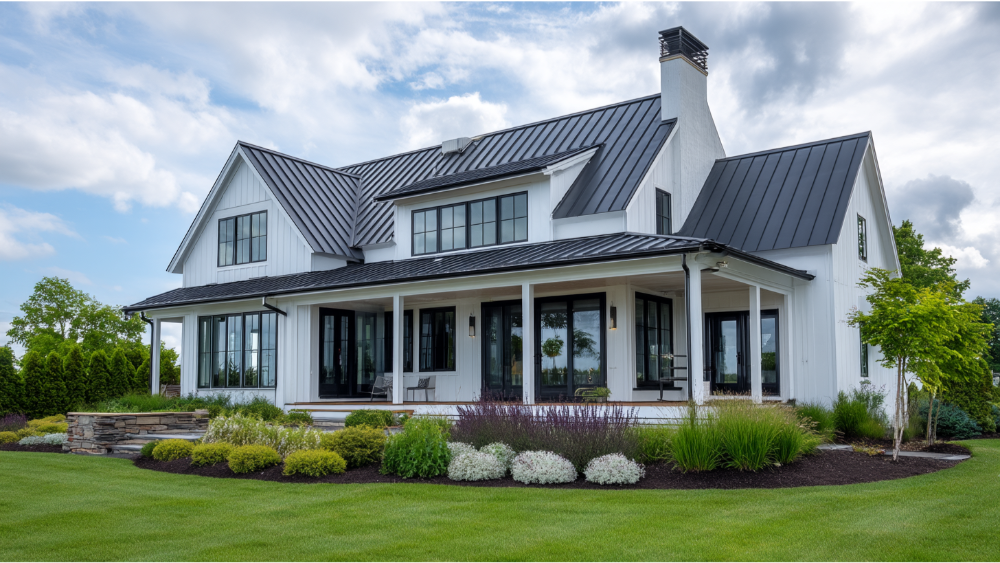
Why Energy Efficiency Matters in Roofing
Energy efficiency plays a big role in your home’s comfort and energy costs. A roof doesn’t just protect, it also affects your ability to control indoor temperature. An energy efficient roof can lower air conditioning use, reduce environmental impact and save thousands over the years.
Metal roofs are great at reflecting heat. Their coatings and surface designs reflect up to 75% of solar radiation, preventing heat from being absorbed into the roof deck and attic space. In hot climates, this reflectivity can save up to 40% of energy costs making them one of the most energy efficient roofing materials available.
Metal roofing makes a difference year round by keeping your home cooler in summer and working well with insulation in winter. That’s why metal systems are used in high end residential and energy conscious commercial buildings.
Asphalt Shingles and Energy Performance
Traditional asphalt shingles absorb more heat especially darker varieties which can drive up cooling bills in summer. While cool roof asphalt options exist, their energy performance degrades over time as granules wear away.
If energy efficiency is your top priority, metal is the clear winner. But properly installed asphalt roofing with adequate attic insulation can still provide reasonable performance in milder climates.
Installation Process: What Homeowners Should Expect
Metal Roof Installation
Installing a metal roof is a specialized installation process that requires advanced training and precision. It involves preparing the roof deck, applying underlayment, cutting and securing interlocking metal panels and sealing seams to prevent leaks or expansion issues.
At Cobex, our experienced roofing professionals follow manufacturer guidelines to ensure every panel is properly placed. Roof complexity can impact labor time and cost so accurate evaluation is key to a successful installation.
Asphalt Shingle Installation
Asphalt shingle installation is more straightforward and faster. The process involves stripping the old material, prepping the surface, laying a water resistant underlayment and securing shingles in overlapping rows. Because asphalt shingles are lighter and easier to handle they’re often installed in less time than metal systems.
This efficiency translates to lower labor costs and quicker project timelines which is why asphalt is the go to option for many homeowners on a budget.
Performance in Extreme Weather
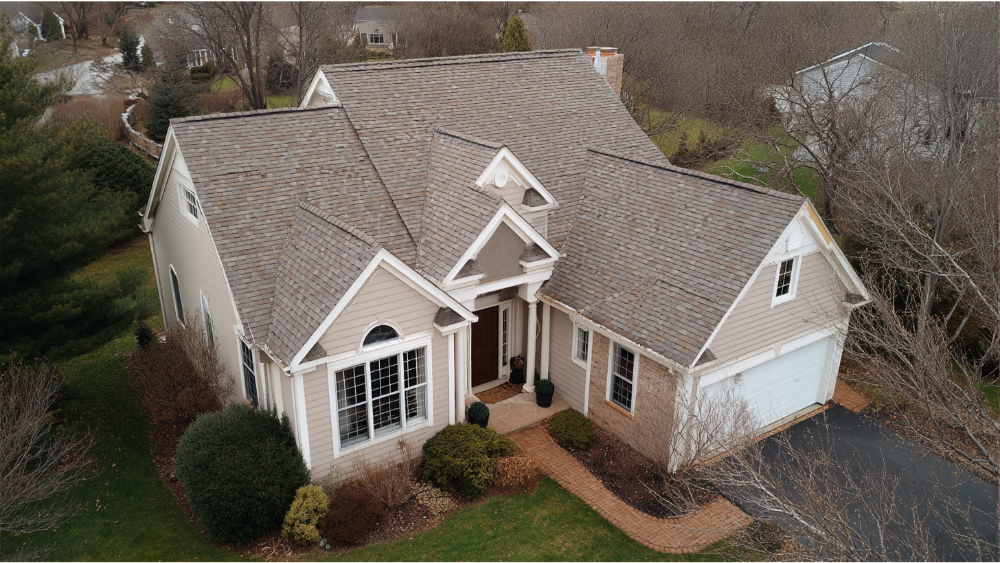
Metal Roofing in Harsh Conditions
When it comes to harsh weather, metal roofing stands out. It resists high winds (up to 120 mph or more), sheds water and snow quickly and won’t ignite during wildfires. This level of protection is ideal for California’s fire prone zones and seasonal storms.
Metal roofs are built for durability. They don’t crack, split or swell under pressure making them a smart investment in areas with extreme weather conditions.
Asphalt Shingles and Storm Resistance
While modern asphalt shingles can handle moderate weather, they’re more prone to wind uplift, hail and long term heat exposure. Some manufacturers now offer reinforced asphalt products for better impact resistance but traditional asphalt roofs may still need repairs after intense weather.
That said, shingles are still an option in areas with mild weather patterns and good roof ventilation.
Design, Style & Curb Appeal
Metal Roofing Design
Metal roofing has a clean, modern look that fits modern architecture but can also be styled to fit traditional homes. With options that mimic shake, slate and even wood shingles, homeowners can choose a design that fits their style without sacrificing performance.
Metal retains its look for decades making it a beautiful and practical choice for homeowners investing in long term property value.
Shingle Roof Design
Asphalt shingles come in a wide range of colors, textures and styles. Whether you want a neutral tone to match your neighborhood or a bold accent for a custom home, there’s likely a shingle that fits. Shingles cost less and provide classic curb appeal that blends with almost any home style.
Solar Compatibility & Noise Factors
Planning for Solar Panel Installation
Metal roofs are ideal for solar energy systems. Standing seam metal panels allow solar attachments without penetrating the roof which helps preserve waterproofing and structural integrity. This makes solar installation cleaner and more efficient.
Shingles can support solar panels too but they require additional flashing and mounting brackets that can increase labor and material costs. Cobex offers both traditional and solar integrated roofing solutions.
Common Metal Roof Myths
One myth about metal roofs is that they’re loud during rain. In reality, with proper underlayment and attic insulation, they’re no noisier than asphalt roofing. Concerns about rust are also outdated, today’s galvanized and coated materials are engineered to resist corrosion even in coastal areas.
How to Decide: Metal or Asphalt Shingle Roofs?
How to Decide: Metal or Asphalt Shingle Roofs?
Key Considerations
Choosing between a metal roof and asphalt shingles ultimately depends on your long-term goals, climate, and budget. If you’re planning to stay in your home for decades and want superior durability, energy efficiency, and low maintenance, a metal roof is often the better investment, even though metal roofing generally costs more upfront.
Metal roofs tend to outperform traditional shingles in both longevity and resistance to weather damage. With a roof’s lifespan extending up to 75 years in many cases, metal systems are ideal for homeowners who want to avoid more frequent repairs and get the most value from their roof. In addition, standing seam metal roofs offer clean aesthetics and tight weather seals, making them especially effective in areas that experience heavy rain or fluctuating temperatures.
While metal roofing panels are more durable, they also offer sustainable advantages, many are made from recycled materials and are fully recyclable at the end of their life. And with fewer components likely to fail over time, they require significantly fewer frequent repairs compared to other systems.
That said, if you’re more focused on upfront affordability or replacing the same roof size on a tighter timeline, asphalt roofing is a great option. Shingles remain the most widely used roofing material in residential neighborhoods for a reason: they’re budget-friendly, easy to install, and come in a wide variety of colors and textures. Just keep in mind that over time, asphalt roofs may require more frequent repairs and are more susceptible to weather damage, especially in high-exposure zones.
When comparing how roofing materials compare side by side, considering cost, maintenance, and lifespan, metal offers long-term value, while asphalt delivers short-term savings and a classic curb appeal.
Cobex: Your Roofing Experts in California
At Cobex Construction Group, we don’t believe in one-size-fits-all solutions. We evaluate your home’s structure, design preferences, roof complexity, and future plans before recommending the best roofing system. Whether you’re upgrading from traditional roofing materials or looking for a fast, cost-effective replacement, our roofing professionals are here to help.
Explore our roof replacement services here.
Frequently Asked Metal Roof Vs Shingles Questions
Is A Metal Roof More Expensive Than Shingles?
Yes, metal roofing has a higher upfront cost but offers more savings over time due to less maintenance and longer lifespan.
Will A Metal Roof Make My Home Hotter Or Colder?
Metal roofing helps regulate heat energy by reflecting solar radiation, keeps homes cooler in summer. With proper insulation, it performs year round.
Are Metal Roofs Noisy During Rain?
No. When installed with proper underlayment and attic insulation, metal roofs are no louder than other roofing materials.
Can You Install Solar Panels On An Asphalt Roof?
Yes, but it involves drilling and sealing. Metal roofing makes solar installation easier and more secure, especially with standing seam systems.
Which Roof Is Better In Northern California?
For areas with harsh weather or wildfire risk, metal is often better. Shingles are a solid choice in temperate areas where initial cost is a bigger concern.
Final Thoughts: Which Roof Is Right for You?
Both metal and asphalt roofs have their place in the modern roofing industry. Metal roofs shine with durability, minimal maintenance and energy efficiency. Asphalt shingles offer affordability, reliable performance and a classic look that works in most neighborhoods.
The most important decision you’ll make isn’t the material, it’s the team that installs it. At Cobex, we take pride in helping homeowners choose confidently and build beautifully. Schedule your free consultation today and let’s find the perfect roof for your home.
Ready to Compare Roofing Options for Your Home?
Whether you’re leaning towards metal or shingles, Cobex Construction Group is here to help. Our licensed roofing professionals will assess your needs, walk you through options and deliver a solution that looks great and performs even better.
Schedule your free roofing consultation today.
Need more info? Visit our roofing services or explore solar energy solutions designed to work with your new roof.



